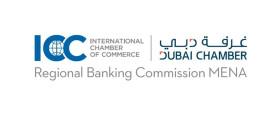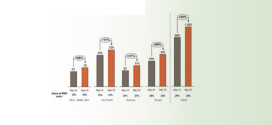The stable performance of trade receivables securitisation (“TRS”) through the volatility of recent years has made it an increasingly important alternative funding source for corporates as well as a favoured corporate financing technique for banks, according to the latest research from working capital specialist Demica.
Conducted amongst Europe’s biggest 30 banks*, along with a small selection of US-based global banks active in Europe, the new study reveals that more than 80 per cent of bank respondents have seen growth in their TRS business or an increase in customer enquiries in the past 12 months. Principal drivers of this positive development are the requirement for corporates to diversify working capital sources; and a recovering economy, according to the survey respondents.
With traditional methods of raising funds now being accompanied with increased financing costs due to more stringent capital regulatory requirements for banks, there is an increasing need for companies to seek alternative funding channels.
At the same time, signs of global economic revival combined with a new-found investor confidence are giving companies a higher degree of assurance and sense of security to tap the capital market via TRS. Spurred by an improving perception of this funding facility, banks’ favourable stance towards the product and a growing investor appetite for this short-dated stable instrument to manage their excess cash, respondents are expecting further growth of TRS in the next twelve months.
High demand is expected to originate in particular from sub-investment grade/non-rated companies, which find it increasingly expensive to borrow from banks. Also helping to fuel the demand are highly leveraged companies. The increased requirement for TRS from the corporate constituency is equally matched by banks’ growing appetite for this credit facility, due to its safer profile and lower consumption of capital compared to unsecured financing.
More than 65 per cent of the surveyed banks see TRS as “very important”. This funding technique is regarded by bank financiers as a particularly useful tool to develop new client relationships and to cross-sell. An overwhelming majority of respondents also confirm their banks’ ambitions to further expand TRS business in the next 12-24 months.
Successful implementation of TRS programmes hinges on various factors, with “accurate reporting” and “quality of banking partner” being considered the two most crucial conditions. Two thirds of respondents regard frequent asset performance reporting as a vital pillar of a TRS programme because of the influential role it plays in managing operational and credit risk, in addition to ensuring transparency. A strong bank partner is required for the provision of stable lines of liquidity and professional project management skills.
Sarah M. Gannon, director of business development at Demica, comments,“The improvement in the global economy brings new opportunities for growth, which in turn encourage companies to make additional investment. Raising affordable working capital to fund corporate projects, however, has become an increasing challenge for companies, in particular for mid-market enterprises, as the post-crisis banking landscape has rendered universally cheap liquidity a thing of the past.
“TRS, with its ability to help companies unlock the value of their debt assets while allowing banks to make the most efficient use of their capital, may, therefore, soon become a standard funding technique in a corporate’s financing repertoire while gaining strategic business importance in the banking space.”
*By assets (compiled using information from SNL Financial)
 Cash And Trade Magazine For Cash and Trade professionals in the Middle East
Cash And Trade Magazine For Cash and Trade professionals in the Middle East




